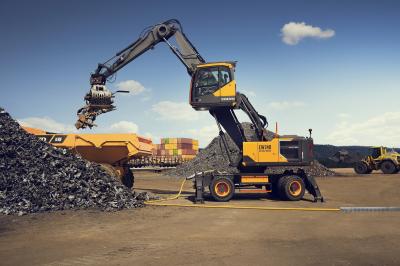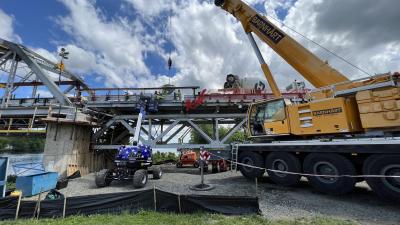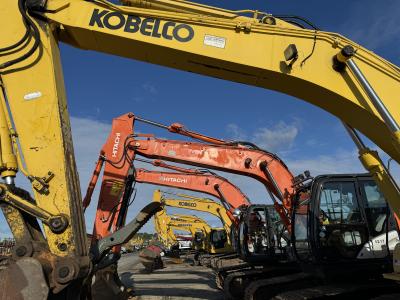“It was quite a culture shock to go from selling construction equipment to hunting Taliban with the Afghan National Army,” said Mark Dublin, an Embedded Tactical Trainer (ETT) of the United States Military.
Dublin had been a territory manager at Groff Tractor & Equipment Inc. in Valencia, Pa., for three years when he was once again called upon to serve in the military.
In addition to his civilian profession, he had served in the National Guard for 19 years, where he learned about weapons and military tactics.
In Afghanistan, he and other ETTs taught these tactics to the Afghan National Army, which has defended Afghanistan’s new government since the fall of the Taliban.
“We went in there and helped them get elections and government,” Dublin explained. “We helped them maintain order.”
That was important, because Taliban loyalists were still setting bombs and opening fire against the Afghan National Army.
“Our job was to go there and teach them how to fight,” Dublin explained.
Dublin was assigned to the southwestern part of Afghanistan, about an hour from the border of Iran.
“The southwestern part of the country is a desert. The temperatures in the summer climbed as high as 130 F, which really tested our resolve at times,” Dublin said.
They survived the heat by staying hydrated, drinking approximately four to five bottles of water an hour.
When asked how native Afghanis survive the heat without air conditioning, Dublin simply said, “They’re tough.”
The heat wasn’t the only challenge. Afghanistan has approximately seven languages — and none of them is English. The most common languages are Dari and Pashto, which are related to Persian and Arabic.
“We had to have linguists with us at all times to communicate,” Dublin said. “Good interpreters contributed greatly to our success.”
As a U.S. army major, much of Dublin’s time was initially spent with senior officers and staff of the Afghan Army. They focused on the military decision-making process. Later, as the operations tempo increased, he participated in the combat missions themselves to advise the Afghanis and to evaluate the skills his team had taught them.
Their efforts paid off. While Dublin was there, they confiscated millions of dollars worth of opium and other illegal drugs. They also captured many weapon caches, and they captured or eliminated various Taliban forces.
“When the Russians left Afghanistan, they literally left their tanks and all of their military equipment, which included munitions,” Dublin said. “The Taliban would find those things and convert them into explosives. As a result, one of the main missions of the Afghan Army was to discover and confiscate these weapon caches before they could be used on us.”
Dublin didn’t help with construction in Afghanistan, but he was aware of construction projects around him. He said construction was an important part of developing the country.
“It was incredible,” Dublin said. “They were building this project. It was called the Ring Road and it was basically the first major asphalt road. It circled the country. It was thousands of kilometers.”
He also was glad to see familiar equipment in Afghanistan.
“It was neat because one of the lines I represent at home is Hamm rollers and so it was great to see them over there in Afghanistan. Building roads is critical when you’re trying to bring a country together, because part of the success of a centralized government is having effective lines of communication, road networks being a critical part of that.”
When Dublin first arrived in Afghanistan, travel took a long time, because there were fewer paved roads.
“When I first got there, our headquarters was in Herat, in western Afghanistan and it was hard to get there… but by the time I left we could get there in under four hours.”
The roads are filled with everything from trucks to foot traffic.
“It’s not uncommon to share the road with a donkey and cart, but they have truck travel there too. That’s a big help to transportation and it also increases trade to other countries,” Dublin said.
Most of the construction is done by PRTs (Provincial Reconstruction Teams). These teams are made up of NATO air force and navy personnel, who offer to drill wells and build schools.
“We’re starting with a blank slate, building schools, hospitals and government buildings over there. This is a country that has never really been united. It’s basically a bunch of independent provinces.”
Will there be opportunities for construction companies in Afghanistan in the future?
“Yes, once the country is truly stabilized,” Dublin said. “They’ve found huge natural gas and coal resources in the north.”
When the country has stabilized, buildings and roads will be needed for industry. Industrial jobs will be an important alternative for Afghani farmers, who currently make a living growing drugs.
“One of their big products is opium,” Dublin said. “They’re the largest opium producer in the world and it’s because the farmers really have no choice… It’s just desert, so it’s not like they could go to work at Wal-Mart or the local steel mill. There’s nothing else. We have to stabilize the government and then we have to get industry to come.”
Now that he is home, Dublin plans to spend time with his family.
“Although I am very proud to have served my country these past 15 months, I am even happier to be home with my wife, Jo, and my daughters Ashley and Sarah,” he said.
He also is glad to be back at work with Groff Tractor & Equipment Inc.
“From the time Groff Tractor was notified through my return, their support of me and my family was first class,” Dublin said. “They gave me time off work to spend with my family and to prepare. They offered differential pay. Mike Savastio, the president, went so far as to offer to buy my car.”
Dublin also appreciated the support he got while in Afghanistan. “When I was away, Katie Reed [director of human resources and marketing] and Susan Woy [operations manager] would always e-mail me to see how I was doing, and they sent care packages.”
There were customers Dublin had built relationships with at Groff that he had to leave.
“As a heavy equipment salesman, I’m in a relationship business it takes years sometimes to build trust. You can’t just replace that overnight with a temp, so Groff definitely took a hit financially for me not being in my territory. Yet they never once mentioned how it was going to affect them. It was just about whether I was okay and whether my family was okay.”
Groff employees weren’t the only ones that supported Dublin. Many of his customers e-mailed him while he was away.
“It does a lot for your morale when you’re literally on the other side of the world in a combat situation. It kept my morale high to know that people cared and were thinking about me.”
Today's top stories















